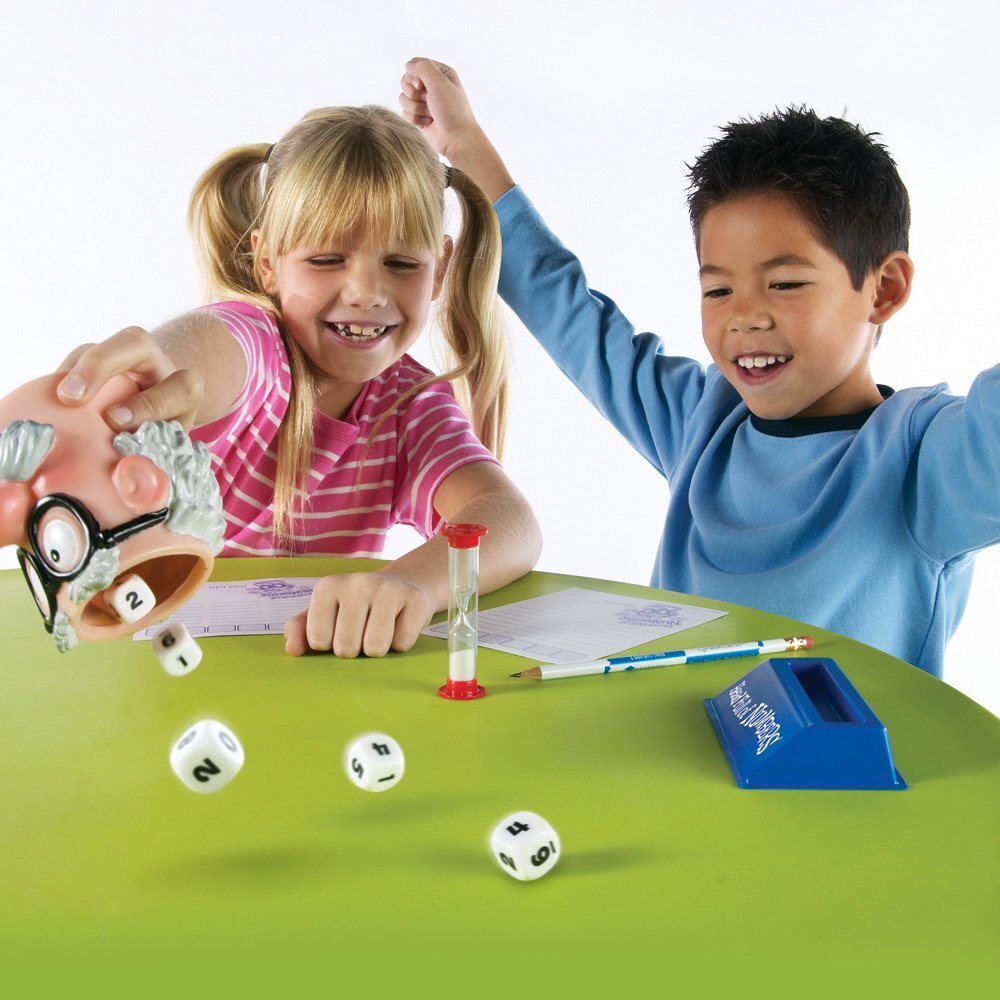Head Full of Numbers
Players: 2 or more (up to a whole class!)
Ages: 7 and up
Purchase: Buy on Amazon (affiliate link)
Math Ideas: operations, math facts, equations
Questions to Ask:
What equations can you make with just these dice?
What counts as a new equation?
What if you couldn't use addition this round?
Some of my favorite classroom activities are the Four Fours or the 2019 Game. I love the way they allow kids to be mathematically creative while also practicing important skills such as writing expressions and equations.
Well, someone took that principle and made a great little game with it. The game is called Head Full of Numbers.
How to Play
Head Full of Numbers is essentially a mathematical variation on Boggle. Instead of letters, you roll six special dice (some of the dice contain the digits that normal dice don't: 0, 7, 8, and 9)
You lay the dice out and set a timer. Then you and your kids race to write as many valid equations as possible using only the digits provided.
So if you roll 0, 2, 3, 4, 5, and 8, you could write:
3 + 5 = 8
8 - 5 = 3
5 + 2 = 4 + 3
20 ÷ 5 = 4
And so on.
The beauty of this game is that is scales up as your children learn more about math. At first, they might only use addition and subtraction. But later they can use multiplication, division, exponents, parentheses, fractions, decimals, you name it! They can even combine digits to make two- and three-digit numbers if they want. They are only limited by their mathematical imagination.
One thing to keep in mind: The timer can bring an element of fun, or it can stress your kids out and make them shut down. You can definitely play a variation on the game where you work to find 10 valid equations, or 20, for each roll of the dice. You can collaborate, you can look for the weirdest or most complicated equation, you can play whatever way your kids like best. No matter what, they'll be doing math.
Where's the Math?
I mean... where isn't the math? Kids of all ages can find some interesting math to discuss in this game.
Specifically, I think it's interesting to discuss with your kids what counts as a new, or distinct, equation.
Let's say your kid writes down the following equations:
4 + 5 = 9
5 + 4 = 9
9 = 4 + 5
9 = 5 + 4
How many different equations did they come up with? Should all 4 count? Just 2? Just 1?
This is definitely worth debating. Personally, I would definitely give credit for at least two: It is not trivial to know that 4 + 5 is equivalent to 5 + 4. There's a whole property, the commutative one, named for that very fact. Also, it doesn't work for every operation, which is a good thing for you and your kids to discuss.
But definitely let your kids come up with their own house rules. As long as everyone agrees beforehand, and as long as your child has some reason they can share as to why they think two equations are actually "the same."
Questions to Ask
Aside from the question above, "How many of these equations should count?" there is plenty you can ask your child while they play.
If your kids are having trouble, you could focus their attention to just three or four of the dice. Say "What equation could you make just with these digits?" and see what they come up with.
If you've played the normal variation a couple of times, you could say "This round, can you make equations that use at least four dice?" or "This time, can you make all equations that don't use addition?" These variations will keep the game fun and lively, and they will get your child to think in a more sophisticated fashion about the sorts of equations she can build.
The last challenge is a doozy: "Can you build an equation that uses all ten digits from 0-9?" If your child solves that one, they might have earned themselves a treat!
Click here to buy Head Full of Numbers on Amazon (affiliate link)




